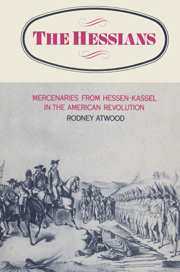Book contents
- Frontmatter
- Contents
- List of maps
- Acknowledgements
- Abbreviations
- Note on German ranks and currency
- Introduction
- 1 The German soldier trade
- 2 The Hessians go to America
- 3 The victories of 1776
- 4 The Battle of Trenton
- 5 The campaigns of 1777–81
- 6 Anglo-Hessian relations
- 7 The Hessian view of the American Revolution
- 8 Hessian plundering
- 9 Hessian desertion
- 10 Recruiting in Germany
- 11 The impact of the war on Hessen
- 12 Conclusion
- Appendices
- Bibliography
- Index
- Frontmatter
- Contents
- List of maps
- Acknowledgements
- Abbreviations
- Note on German ranks and currency
- Introduction
- 1 The German soldier trade
- 2 The Hessians go to America
- 3 The victories of 1776
- 4 The Battle of Trenton
- 5 The campaigns of 1777–81
- 6 Anglo-Hessian relations
- 7 The Hessian view of the American Revolution
- 8 Hessian plundering
- 9 Hessian desertion
- 10 Recruiting in Germany
- 11 The impact of the war on Hessen
- 12 Conclusion
- Appendices
- Bibliography
- Index
Summary
Whenever a Prince undertakes to sell his Subjects to a Foreign Power for infamous and wicked purposes, without their knowledge or consent, we are of the opinion, such subjects have a right to vacate the contract as soon as opportunity offers. This doctrine we conceive to be authorized by the law of nations, by reason and by common sense.
The view of society which they brought with them to America disposed most Hessian officers to look unfavourably on the new Republic. But some did find the American way of life attractive. Captain Friedrich von der Malsburg of Ditfurth's and Ensign Friedrich von der Lith of the Leib-Regiment admired the political and social freedom of America. Malsburg was a very gallant officer, winning the order Pour la vertu militaire for leading one of the attacking columns with a party of Jdger against Sullivan's troops on Rhode Island in August 1778. His battalion commander wrote on his confidential report in 1788, ‘The good qualities and conduct [of this officer] are unsurpassed … he performs his duties with alacrity and exactness.’ Unfortunately he was involved in the disgraceful abandonment of Rheinfels to the French in 1794, and stripped of his Order by Wilhelm IX. During the war in America he married the daughter of Sir Egerton Leigh, the King's Attorney General of South Carolina; after it he corresponded with those Hessian officers who had taken their discharge to settle in America, and he became an honorary member of the German Society of New York, which had Steuben as its president.
- Type
- Chapter
- Information
- The Hessians , pp. 184 - 206Publisher: Cambridge University PressPrint publication year: 1980

